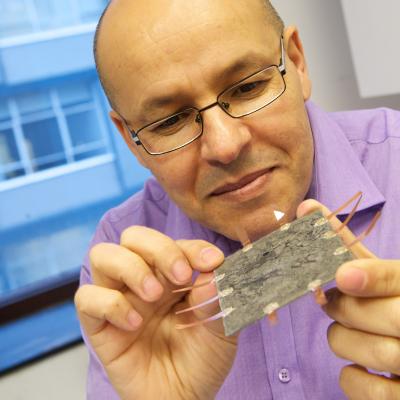A research team comprising Mohamed Saafi and David McGahon from the University of Strathclyde is developing an economical, eco-friendly smart paint capable of detecting tiny faults in bridges, mines and wind turbines well before the occurrence of structural damage using nanotechnology.
 Dr. Mohamed Saafi, University of Strathclyde (credit: University of Strathclyde)
Dr. Mohamed Saafi, University of Strathclyde (credit: University of Strathclyde)
The research team uses well-aligned carbon nanotubes and fly ash, a recycled waste product, for producing the smart paint. When mixed, the resulting paint demonstrates a property analogous to cement, making it suitable for adverse conditions. Since fly ash is the major raw material used for producing the paint, the product has superior durability and its cost is mere 1% of that of existing inspection techniques.
The researchers have developed and tested a prototype, and their results have confirmed the effectiveness of the novel paint technology. Saafi believes that the team is now able to demonstrate the effectiveness of the smart paint on a larger structure. The paint can be applied by simply spraying onto any types of surfaces and the attached electrodes can sense structural damage prior to failure occurs.
According to Saafi, the monitoring system comprises a wireless sensor network wherein wireless communication nodes that have power harvesting and warning functionalities are interfaced with the paint to remotely monitor any unnoticed damage like micro-cracks in large structures such as wind turbine concrete foundations. Saafi added that the combination of the smart paint and the wireless monitoring system decreases the maintenance costs of these larger structures, while optimizing their safety.
Saafi further said that since the smart paint is coated over the entire structure, it increases the chance of avoiding major damages.
Source: http://www.strath.ac.uk